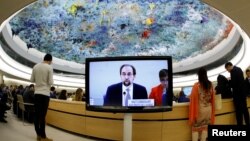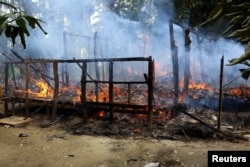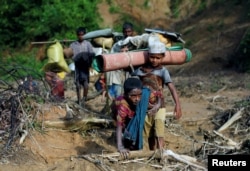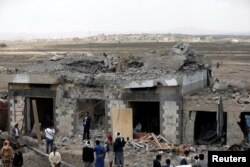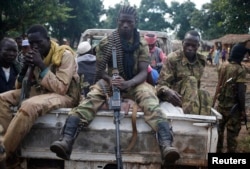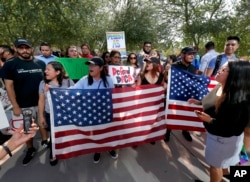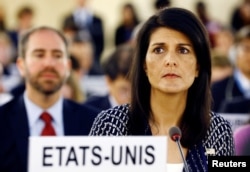Zeid Ra’ad al-Hussein, the United Nations' high commissioner for human rights, painted a dark picture of growing violations and abuse around the world in an address to delegates at the opening of the 36th session of the U.N. Human Rights Council Monday.
While condemning the actions of violent extremists and terrorists, he warned of the greater dangers to society from governments that “peel away at human rights protections,” watching societies gradually unravel as an increasing number move toward “authoritarianism and oppression.”
The current session is expected to be particularly active. Over the next three weeks, the 47-member body will explore more than 80 topics and country reports presented by more than 25 human rights experts and investigative bodies on a wide range of issues, including torture, arbitrary detention and enforced disappearances.
Two-hundred-and-30 side events organized by non-governmental organizations and an additional 50 state-sponsored side events will be held dealing with a myriad of issues, from the human rights records of specific countries to terrorism.
Contentious debates expected
General debates will be held on the findings of reports submitted respectively by the U.N. Commissions of Inquiry on Syria and on Burundi. Vigorous, often contentious discussions are expected during interactive dialogues on human rights situations in dozens of countries.
High Commissioner Zeid presented an overview of the global situation in which he highlighted his concerns about extensive gross human rights violations in 39 countries.
Rohingya issue
He condemned the brutal security operation under way in Myanmar’s Rakhine state, which, according to latest reports from the International Organization for Migration, has prompted more than 300,000 minority Muslim Rohingya to flee to Bangladesh in fewer than three weeks.
"The situation seems a textbook example of ethnic cleansing," Zeid said.
“We have received multiple reports and satellite imagery of security forces and local militia burning Rohingya villages, and consistent accounts of extrajudicial killings, including shooting fleeing civilians.”
He said the widespread or systematic attacks against the community could amount to “crimes against humanity.” He called on the Myanmar government to end its current cruel military operation and reverse its discrimination against the Rohingya. Myanmar's de facto leader, Aung San Suu Kyi, has been criticized for her response to the violence. She says there has been an "iceberg of misinformation" over Rohingya.
An independent international fact-finding mission on Myanmar next week will update the council on the alleged abuses carried out by the military forces.
The high commissioner called the human rights situation in Yemen “extremely alarming,” condemning the Saudi-led coalition airstrikes in Yemen for causing most of the nearly 14,000 civilian deaths and injuries since the start of the conflict in March 2015.
U.N. officials report that the Netherlands will table a resolution calling for an independent investigation on Yemen.
Central African Republic
Turning to Africa, High Commissioner Zeid expressed alarm by the sharp deterioration in the security situation in Central African Republic.
“I am extremely concerned about persistent reports of atrocity crimes, which are pushing the country very close to a complete breakdown along religious and ethnic lines.
“Anti-Balaka and ex-Seleka forces, as well as various splinter groups, are responsible for the escalating cycles of reprisal attacks, which are fueled by incitement to hatred and violence by religious leaders and other leading figures.”
He bemoaned the situation in South Sudan, which he said was “being quite simply destroyed by the devastating violence under way across much of the country.”
US on human rights
Separately, Zeid criticized the Trump administration for its decision to end the Deferred Action for Childhood Arrivals program, known as DACA, in October in six months’ time, “despite evidence of its positive impact on the lives of almost 800,000 young migrants, and on the U.S. economy and society.”
Trump urged Congress to step in during the six-month delay to provide former DACA beneficiaries who were illegally brought to the U.S. as children with “durable legal status.”
The United States, which was elected for a three-year term as a member of the council in October, is expected to play an active and, some would say, controversial role in this session.
On a visit to Geneva in June, U.S. Ambassador to the United Nations Nikki Haley told the council that Washington’s continued membership in the organization depended on its reform of the elections and membership process, on removing Israel and the occupied Palestinian territories as a separate agenda item and on putting greater focus on country-specific human rights issues.
The United States, which has expressed concern about the human rights crises in Burundi and Venezuela, is expected to follow those issues closely. In response to an address by Venezuelan Foreign Minister Jorge Arreaza, at the council Monday, the U.S. mission issued a statement accusing him of trying to shift attention away from “the Maduro regime’s sustained repression of political dissent.”
The U.S. called this “an affront to the council” and urged the international community "to condemn the [Nicolas] Maduro regime for the assumption of legislative powers by an illegitimate constituent assembly.”
This is the final year of Zeid’s mandate as high commissioner. In concluding his remarks, he noted that the world had grown darker and dangerous during this time.
“Human rights principles are the only way to avoid global war and profound misery and deprivation,” he said.
